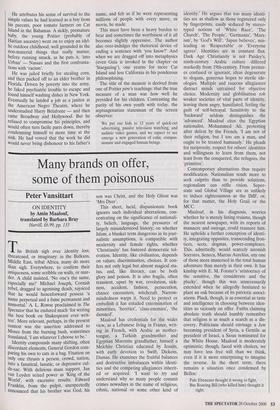Many brands on offer, some of them poisonous
Peter Vansittart
ON IDENTITY by Amin Maalouf, translated by Barbara Bray Harvill, £6.99, pp. 133 The British sigh over identity lost, threatened, or imaginary: in the Balkans, Middle East, tribal Africa, many do more than sigh. Everywhere, to confirm their uniqueness, some scribble on walls, or mur- der. A child insisted, 'No one's the same, especially me!' Michael Joseph, Cornish rebel, dragged to agonising death, rejoiced that he would henceforward possess 'a name perpetual and a fame permanent and immortal.' A. L. Rowse proclaimed in The Spectator that he endured much 'for writing the best book on Shakespeare ever writ- ten'. More relevant, perhaps, in the present context was the assertion addressed to Moses from the burning bush, sometimes translated, 'I am whatever I choose to be.'
Identity compounds many shifting, often discordant elements, General Gordon com- paring his own to cats in a bag. Fixation on only one thrusts a person, crowd, nation, into a fanatical, lunatic, or depressive cul- de-sac. With delirious mass support, Jan van Leyden seized power as 'King of the World', with excessive results. Edward Franklin, from the pulpit, unexpectedly announced that his brother was God, his son was Christ, and the Holy Ghost was `Mrs Dyer'.
This short, lucid, dispassionate book ignores such individual aberrations, con- centrating on the significance of nationali- ty, beliefs, language, the pressures of largely misunderstood history; on whether Islam, a blanket term dangerous in its jour- nalistic assumptions, is compatible with modernity and female rights, whether `Christianity' has fostered democratic tol- eration. Identity, like civilisation, depends on values, discrimination, choices. It con- fers not only legal but almost magical sta- tus, and, like literacy, can be both glory and poison. It is also fragile, often transient, upset by war, revolution, sick- ness, accident, fashion, persecution, chance encounters, witchcraft. Narrow- mindedness warps it. Need to protect or embellish it has entailed extermination of minorities, 'heretics', 'class-enemies', 'the damned'.
Maalouf has credentials for the wider view, as a Lebanese living in France, writ- ing in French, with Arabic as mother- tongue, a Turkish grandmother and Egyptian Maronite grandfather, himself a Melchite Christian educated by Jesuits, with early devotion to Swift, Dickens, Dumas. He examines the fruitful balances and destructive imbalances within identi- ties and the competing allegiances inherit- ed or acquired. 'I want to try and understand why so many people commit crimes nowadays in the name of religious, ethnic, national or some other kind of identity.' He argues that too many identi- ties are as shallow as those registered only by fingerprints, easily seduced by stereo- typed notions of 'White Race', 'The Church', 'The People', 'Germania', 'Marx- ism', by 'God's Will', 'Japan believes', mis- leading as 'Respectable' or 'Everyone agrees'. Identities are in constant flux. Dark Age Christianity is not Paisley's, ninth-century Arabic culture differed markedly from 19th-century. From premis- es confused or ignorant, ideas degenerate to slogans, generous hopes to sterile ide- ologies. Multiple and raucous allegiances distract minds untrained for objective choice. Modernity and globilisation rob weaker societies of vital parts of identity, leaving them angry, humiliated, feeling the guilt of self-betrayal. Sensitivity to the `backward' seldom distinguishes the `advanced'. Maalouf cites the Egyptian nationalist, Mohammed Ali, protesting after defeat by the French, 'I am not of their religion, but I too am a man, and ought to be treated humanely.' He pleads for reciprocity, respect for others' identities and willingness to learn from them, not least from the conquered, the refugees, the `primitive'.
Contemporary alternatives thus require modification. Nationalism tends more to seek culprits than to provide solutions, regionalism can stifle vision. Super- state and Global Village are as unlikely to induce righteousness as the IMF, or, for that matter, the Holy Grail or the MCC.
Maalouf, in his diagnosis, worries whether he is merely listing truisms, though the nearest newspaper, with its reports of massacre and outrage, could reassure him. He upholds a further conception of identi- ty, integrating opposites, transcending fron- tiers, sects, dogmas, power-complexes. This, admittedly, would scarcely astonish Socrates, Seneca, Marcus Aurelius, any one of those more immersed in the total human adventure than merely in their own. It has kinship with E. M. Forster's 'aristocracy of the sensitive, the considerate and the plucky', though this was unnecessarily extended when he allegedly hesitated to plant an oak because of its patriotic associ- ations. Pluck, though, is as essential as taste and intelligence in choosing between iden- tities so viciously on offer. Faiths claiming absolute truth should humbly remember that religion is as much a search as a dis- covery. Politicians should envisage a Jew becoming president of Syria, a Gentile as president of Israel, a Sioux nominated for the White House. Maalouf is moderately optimistic; though, faced with choices, we may have less free will than we think, even if it is more enterprising to imagine the reverse. In the short term, there remains a situation once condensed by Belloc:
Pale Ebenezer thought it wrong to fight, But Roaring Bill (who killed him) thought it right.


























































































 Previous page
Previous page